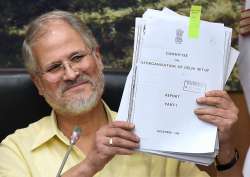'Elected govt doesn't mean rulers; confine yourself to your job': Najeeb Jung to Arvind Kejriwal after HC verdict
Armed with historic High Court verdict, Delhi’s Lieutenant Governor Najeeb Jung on Tuesday advised Aam Aadmi Party government to confine itself to the roles and jobs which are in the framework of the Constitution.

Armed with "historic” High Court verdict, Delhi’s Lieutenant Governor Najeeb Jung on Tuesday advised Aam Aadmi Party government to confine itself to the “roles and jobs which are in the framework of the Constitution.”
Addressing his first press conference during three years in office, Jung said, "When we get elected, it doesn't mean we are rulers and instead we will have to work and confine ourselves to our roles and jobs which are in the framework of the Constitution.”
Jung's remarks came hours after the Delhi High Court held that the LG is the administrative head of the National Capital Territory and the AAP government's contention that he is bound to act on the advice of the Council of Ministers was "without substance".
He said that today's judgment of the Delhi High Court is a "historic" and in view of this, he has come out to address his first press conference in the last three years.
Jung said that the verdict is neither a victory for him nor a defeat for Chief Minister Arvind Kejriwal, noting its crux is to govern the city as per the provisions in the Constitution.
When asked why he did not speak to media when AAP leaders, including the CM, "attacked" him on several issues, Lt Governor quoted a couplet from famous war cry of independence movement ‘Sarfaroshi ki Tamanna’ and said, "Waqt aane pe bata denge tujhe aye aasman, Hum abhi se kya batayen kya hamare dil mein (When the time comes, we shall show thee, O heaven/For why should we tell thee now, what lurks in our hearts?)
He said that there was no aggression on his part and he did not try to interfere in the functioning of an elected government but as Delhi is a Union territory, they (AAP) will have to seek the LG's nod as per the Constitution.
"In Delhi, there was a chief commissioner's rule in 1920. The power of commissioner was handed over to the Lt Governor. In 1989, the central government had formed Balakrishanan committee and there was a debate on its report in Parliament.
"The report favours that Delhi should remain Union territory and should not be made full statehood. In the report, Balakrishnan said that as we will have Assembly, but we should keep it (Delhi) union territory," Jung said.
The Lt Governor said that he was the delegate of President of India.
On prospects of better relations with the Kejriwal government, Jung said, "We did not start tussle with them (AAP government). We just tried to make them (files and notifications sent by government for his nod) correct as per the Constitution. If they have any problem, we send back to government asking it to correct them as per the Constitution."
He said that a number of decisions including Delhi Government's directions to power regulator DERC, appointment of government representatives to BSES board and certain orders relating to tax will have to be "corrected" as they did not have his concurrence.
Asked about the Commission of Inquiry to probe alleged CNG-fitness scam and revision of stamp duty for agricultural land, the LG said that the Kejriwal government should reply to people what is its relevance now.
"I think judges appointed as Chairman of the Commission of Inquiry by the government may be getting 3-6 lakh salary. They should give answer to people. Besides, the government's order of revising stamp duty has also been set aside by the Court," he further said.
Deputy Chief Minister Manish Sisodia said that it will challenge the order in the Supreme Court and questioned why the Constitution was amended to have a legislative assembly if the city was to be run by the LG.
"We respectfully disagree with the High Court verdict," Deputy Chief Minister Manish Sisodia said, adding there was a "big difference" between any other Union Territory and the national capital and alleged that on the "pretext of rules", various decisions aimed at curbing corruption have been stalled.